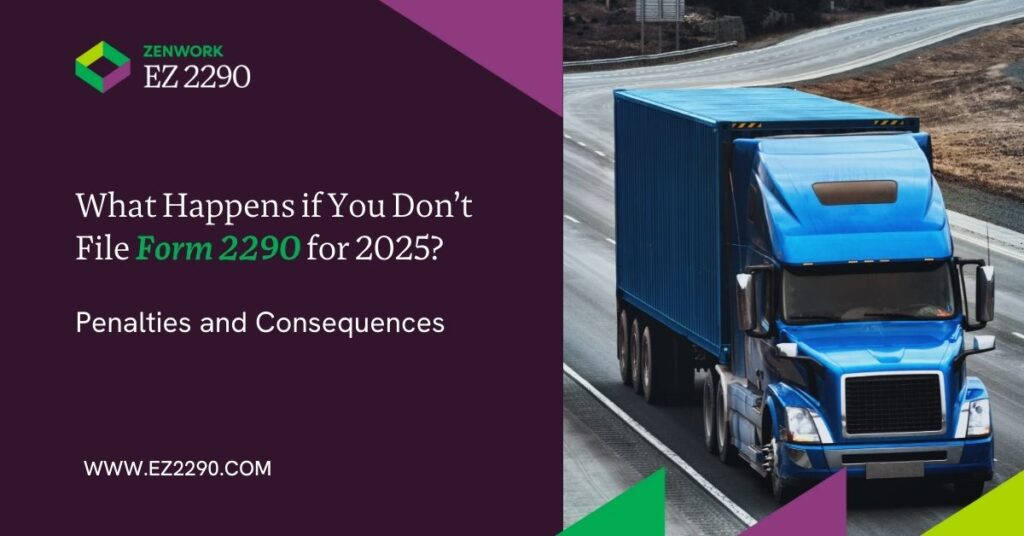Form 2290 is not optional. If your truck weighs 55,000 pounds or more and operates on public highways, you’re expected to file this federal heavy vehicle use tax (HVUT) return each year. Skip it, miss the due date, or underpay, and you’re looking at real penalties. The consequences of not filing Form 2290 are immediate, and in many cases, more expensive than the actual tax.
Let’s walk through what happens when you don’t file Form 2290 for 2025, breakdown 2290 late filing penalties, and understand what you can do to avoid unnecessary fines.

Immediate Penalties for Not Filing Form 2290
If you miss the deadline (which for most is August 31, 2025, for vehicles first used in July), the IRS starts applying penalties the very next day. These are the core 2290 late filing penalties you’re looking at:
- 4.5% of your total tax due per month (or part of a month).
- Penalty stacks for up to 5 months, maxing out at 25%.
- This is for not filing the form, even if you eventually pay the tax.
Let’s say you owe $550 in HVUT. If you file five months late, you’re now paying $687.50—just in heavy vehicle tax penalties. That’s not counting the IRS penalties Form 2290 may apply on the unpaid amount.
If You File but Don’t Pay
You submitted Form 2290, but didn’t pay the tax? The IRS will hit you with a 0.5% penalty per month on the unpaid balance, again for up to 5 months.
That’s in addition to interest, which accrues at the federal short-term interest rate + 0.5% monthly. These numbers add up fast.
Bottom line: you don’t get a free pass just because you filed. You have to both file 2290 to avoid fines and pay it on time.
IRS Notices and Collection Actions
If you don’t file or pay, eventually you’ll get a letter generally CP215. This is a formal IRS notice about penalties and interest being charged. You’ll be given an option to dispute or pay, but make no mistake, at this point, the consequences of not filing Form 2290 are official, and the bill is growing.
Ignore that? The IRS can garnish refunds, apply levies, and make collection calls.
You Can’t Register Your Vehicle Without Schedule 1
This isn’t just a tax compliance issue. Without proof of payment (IRS-stamped Schedule 1), you can’t register your vehicle. You can’t renew tags. You can’t legally operate.
Many find out about 2290 late filing penalties only when they’re turned away from the DMV. By then, it’s already too late to avoid interest and fines.
This directly impacts fleets too. Failing to file for one or more vehicles in a fleet can delay renewals and sideline trucks translating to lost income.
What If You Make a Mistake on Form 2290?
Incorrect VIN? Wrong weight category? If the IRS sees a discrepancy, you could be penalized under IRS penalties Form 2290 even if you submitted the form on time.
Mistakes don’t always get a grace period. That’s why double-checking everything from EIN to vehicle details matters. If you filed with errors and don’t fix them quickly, it’s as if you didn’t file at all.
Reasonable Cause? Maybe. But Don’t Count on It.
The IRS may waive 2290 late filing penalties or heavy vehicle tax penalties if you can prove reasonable cause. That’s not “I forgot” or “I didn’t know.” We’re talking serious stuff here like natural disasters, serious illness, unavoidable business disruptions.
You’ll need to attach a signed statement and backup evidence with your late return. There’s no guarantee they’ll accept it. It helps, but of course prevention is better than gambling on approval.
Repeat Offenses Get Worse
Late one year? You’re hit with the standard IRS penalties Form 2290. But if you repeatedly ignore HVUT obligations, you risk further scrutiny. The IRS may flag your EIN, increase audits, and scrutinize your filings more closely.
The consequences of not filing Form 2290 are more than financial at that point. They start affecting your compliance profile.
Common Mistakes That Trigger Penalties
- Filing under the wrong EIN (especially if it’s newly issued and not yet in the IRS system).
- Entering incorrect VINs or weights.
- Assuming you don’t owe if the truck wasn’t used full-time.
- Not filing for vehicles that were sold or suspended after partial use.
- Submitting payments without the Form 2290-V payment voucher (when paying by check).
Any of these can delay processing and lead to 2290 late filing penalties.
Conclusion: File Early, Not Just on Time
Waiting until the August 31 deadline isn’t smart. E-filing earlier gives you time to correct any IRS rejections. If your return gets rejected on August 31 at 11:59 p.m., you’re considered late.
To file 2290 to avoid fines, aim for early August at the latest. Earlier is safer. So, eFile it today with EZ2290.